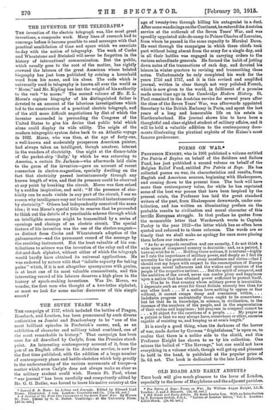THE INVENTOR OF THE TELEGRAPH.*
TEE invention of the electric telegraph was, like most great inventions, a composite work. Many lines of research bad to converge before it became possible to send messages with that practical annihilation of time and space which we associate to-day with the notion of telegraphy. The work of Cooke and Wheatstone and Steinheil will never be forgotten in the history of international communication. But the public, which usually goes to the root of the matter, has rightly crowned the labours. of the great American whose belated biography has just been published by coining a household word from his name, and his alone. The code which is universally used in telegraphy is known all over the world as "Morse," and Mr. Kipling has lent the weight of his authority to the verb "to merge." The second volume of Mr. E. L. Morse's copious biography of his distinguished father is devoted to an account of the laborious investigations which led to the construction of a practical electric telegraph, and of the still more difficult negotiations by dint of which the inyentor succeeded in persuading the Congress of the United States to give his device that public trial which alone could display its wide utility. The origin of the modern telegraphic system dates back to an Atlantic voyage in 1832. Morse, who was then, at the age of forty-one, a well-known and moderately prosperous American painter, had always taken an intelligent, though amateur, interest in the wonders of electricity. One night at the dinner-table of the packet-ship ' Sully,' by which he was returning to America, a certain Dr. Jackson—who afterwards laid claim to the germ of the invention—gave an account of recent researches in electro-magnetism, specially dwelling on the fact that electricity passed instantaneously through any known length of wire, and that its presence could be observed at any point by breaking the circuit. More was then seized by a sudden inspiration, and said: "If the presence of elec- tricity can be made visible in any part of the circuit, I see no reason why intelligence may not be transmitted instantaneously by electricity." Others had independently conceived the same idea ; it was Morse's special title to renown that he proceeded to think out the details of a practicable scheme through which an intelligible message might be transmitted by a series of openings and closings of an electric circuit, The special feature of his invention was the use of the electro-magnet- as distinct from Cooke and Wheatstone's adoption of the galvanometer—and the permanent record of the message by the receiving instrument. Not the least valuable of his con- tributions to science was the invention of the relay and of the dot-and-dash alphabet, without either of which the telegraph would hardly have obtained its universal applications. He was endowed by nature with that "infinite capacity for taking pains" which, if it is not altogether synonymous with genius, is at least one of its most valuable concomitants, and this interesting record of his labours deserves a high place in the history of epoch-making inventions. Was Dr. Morse, we wonder, the first man who thought of a two-letter alphabet, or must we look for some earlier discoverer of this simple secret ?






































 Previous page
Previous page